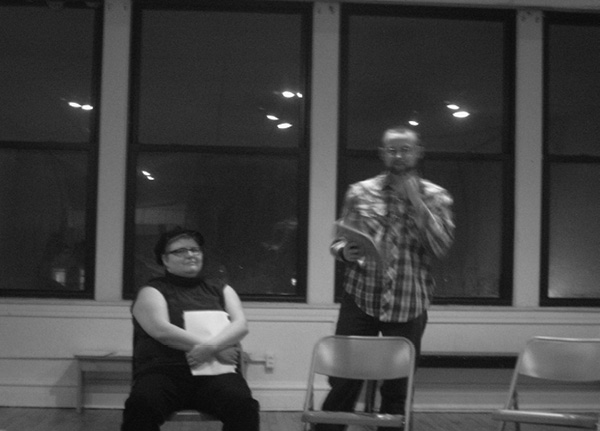
RESTRICTIVE ANDRAGOGIES AND EX-CITATION
first performed on
February 19, 2011
Red Rover Series #43, Chicago, IL
performed once in 2011
NICHOLAS ALEXANDER HAYES & JEN BESEMER
Chicago, IL
056541676n056541676h056541676a056541676y056541676e056541676s056541676@056541676c056541676o056541676l056541676u056541676m056541676.056541676e056541676d056541676u
nhayes@colum.edu
RESTRICTIVE ANDRAGOGIES AND EX-CITATION
NICHOLAS ALEXANDER HAYES & JEN BESEMER
We are anxious because some composition instructors have imbued grammar with moral authority. When a student drops articles or makes a spelling error, these instructors feel affronted. They see the perpetrators as violating the sacred trust that the Puritan work ethic and the English language ensure. These instructors feel condemned to fail these students who have violated the essence of American culture. Etymologically, grammar is the sibling of grimoire, the witch’s book. Like the grimoire, grammar promises to give us control over the world. Michael de Landa points out that 500 hundred years ago language was more fluid. But then the language of Paris became the language of France, the language of Castile became the language of Spain; power standardized our languages for its own purpose. The rules of grammar are harnessed to the mechanics of imperium.
At the time of the performance, we had been teaching college writing courses for several years. We were experimenting with using ubiquitous spiral bound handbooks required in college writing classes and online bibliographic citation generators to craft poetic texts. We sought to transform the tools for grammar into something that invites ideas and language into less constrained realms. Our performance asked what happens when tools intended to corral and control language are turned away from that purpose and used “incorrectly,” used deliberately in “error,” to create something new.
“Restrictive Andragogies and Ex-citation” was designed to mimic a stereotypical workshop session of an undergraduate writing class, complete with worksheet-based activities and round-robin text performance. We began by performing model poems composed by misusing grammar tools, then mentored audience/participants through the worksheet activity derived from that composition process. At the end of this worksheet activity, audience/participants became audience/performers, reading the texts they had created during the activity. The overall shift from audience/spectator to audience/performer was fostered (some would say “forced”) by the structure of the event. It wound up moving along almost exactly like a team-taught class with exceptionally engaged students.